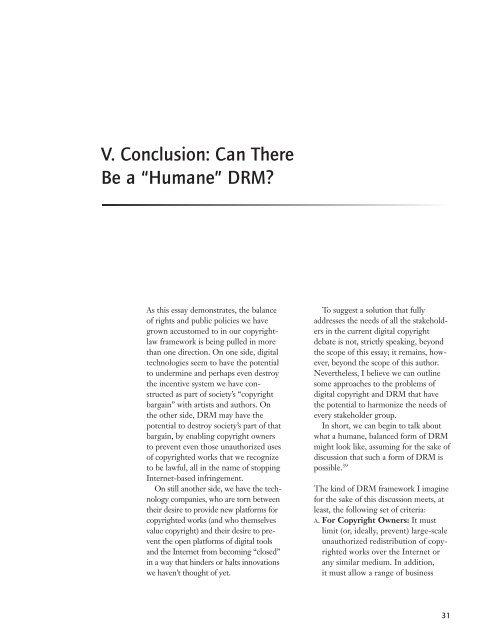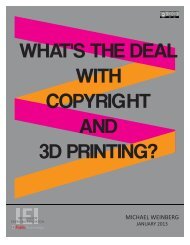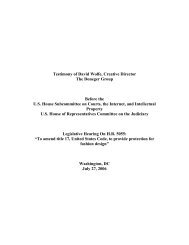What Every Citizen Should Know About DRM, aka - Public Knowledge
What Every Citizen Should Know About DRM, aka - Public Knowledge
What Every Citizen Should Know About DRM, aka - Public Knowledge
Create successful ePaper yourself
Turn your PDF publications into a flip-book with our unique Google optimized e-Paper software.
V. Conclusion: Can ThereBe a “Humane” <strong>DRM</strong>?As this essay demonstrates, the balanceof rights and public policies we havegrown accustomed to in our copyrightlawframework is being pulled in morethan one direction. On one side, digitaltechnologies seem to have the potentialto undermine and perhaps even destroythe incentive system we have constructedas part of society’s “copyrightbargain” with artists and authors. Onthe other side, <strong>DRM</strong> may have thepotential to destroy society’s part of thatbargain, by enabling copyright ownersto prevent even those unauthorized usesof copyrighted works that we recognizeto be lawful, all in the name of stoppingInternet-based infringement.On still another side, we have the technologycompanies, who are torn betweentheir desire to provide new platforms forcopyrighted works (and who themselvesvalue copyright) and their desire to preventthe open platforms of digital toolsand the Internet from becoming “closed”in a way that hinders or halts innovationswe haven’t thought of yet.To suggest a solution that fullyaddresses the needs of all the stakeholdersin the current digital copyrightdebate is not, strictly speaking, beyondthe scope of this essay; it remains, however,beyond the scope of this author.Nevertheless, I believe we can outlinesome approaches to the problems ofdigital copyright and <strong>DRM</strong> that havethe potential to harmonize the needs ofevery stakeholder group.In short, we can begin to talk aboutwhat a humane, balanced form of <strong>DRM</strong>might look like, assuming for the sake ofdiscussion that such a form of <strong>DRM</strong> ispossible. 39The kind of <strong>DRM</strong> framework I imaginefor the sake of this discussion meets, atleast, the following set of criteria:A. For Copyright Owners: It mustlimit (or, ideally, prevent) large-scaleunauthorized redistribution of copyrightedworks over the Internet orany similar medium. In addition,it must allow a range of business31





